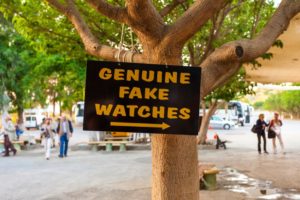How to Be Aware and Avoid Buying Counterfeit Goods

Under the Consumer Protection from Unfair Trading Regulations (2008), traders are not allowed to pass off their goods as another product. This includes counterfeit goods – fake items deliberately made to look genuine. These are often of lower quality than the original and some could even present a health hazard. There are no cast iron guarantees, but consumers can take a number of steps to protect themselves against inadvertently buying fake goods. Be a savvy consumer – know your rights, know the signs of fake goods, and know what to do if you think you have been a victim.
Which goods can be Faked?
Pretty much anything. Fake goods can include medicines, clothing, jewellery, watches, sunglasses, accessories, perfume, make-up, skincare products, CDs, DVDs, software, video games, vehicle parts, power tools, white goods, and even potentially dangerous items like alcohol, tobacco and fireworks.
Brands take great care to protect their trademarks, but nonetheless fake branded goods and pirate CDs, DVDs, software and games are common. Many people are familiar with grainy, disappointingly-recorded pirate movies, but counterfeit goods in general are unlikely to be of the same high quality as the genuine article. For example, Ray-ban sunglasses usually have strengthening metal struts inside the arms, glass lenses and a smoothly moulded construction. Fake Ray-bans often lack one or more of these features, meaning that they are of inferior quality and may not even look very convincing. Is it really worth lining criminals’ pockets for the sake of a badly imitated trademark?
Illicit cigarettes and tobacco are common in the UK. Fake tobacco – cheap, low quality tobacco repackaged to imitate a genuine brand – could present a real health risk since it is unregulated. This means the contents, including tar and nicotine levels, are unknown.
In the UK it is illegal to produce alcohol for sale without a licence. Legal drinks contain ethanol, which is safe in small quantities. Unregulated alcohol may contain cheaper, more dangerous alternatives such as methanol, cleaning fluids and nail varnish remover – all of which lead to a feeling of drunkenness but can have serious consequences for your health.
Derbyshire’s Burton Mail reports that in 2014 Trading Standards seized 10,000 tonnes of fake fireworks across the UK. It is illegal to sell fireworks without a licence, and even licenced retailers are inspected regularly in the run-up to Bonfire Night. Stay safe on November 5th – avoid buying fireworks from unusual sources like residential properties, car boot sales and vehicles.
Where are Counterfeit Goods Sold?
Criminals may operate from off-high-street places such as car parks, markets and car boot sales, but seemingly legitimate shops may also be knowingly selling counterfeit goods. In October 2015, two shops were closed down in Kent when it was revealed that they were dealing almost exclusively in fake tobacco. A shop or stall may look legitimate, but that is no guarantee.
Many shoppers in search of bargains turn to online retailers. Look for the signs of potentially fake goods, following the golden rules outlined in the next section. Be very wary of entering your payment details into websites that you suspect may be selling fake goods. Is it really worth playing into a criminal’s hands just for the sake of a cheap deal?
Top Tips to Avoid Buying Fake Goods
1. Check the price. If it seems to good to be true, it probably is. Check the price of the item you are shopping for and if you find retailers selling far below this price, the goods could be fake.
2. Shop around. If in doubt, check the item against well-known high-street retailers or the manufacturer’s website. Do the trademark, price and item features match? If not, maybe you are looking at a fake.
3. If you are confronted with something you think is fake in a shop or street market, unobtrusively inspect the item. Websites like wikihow.com and visihow.com have written guides on how to recognise counterfeit merchandise, and there are many youtube videos demonstrating this for specific products too. Make sure the guide you are using is reputable.
4. Ask for a receipt. Before purchasing an item, ensure that the retailer is going to give you a receipt.
5. Check the company is legitimate. Check HMRC’s list of all registered companies here https://www.gov.uk/get-
6. Scan the barcode using your smartphone. Several free apps will enable you to scan the code and reveal whether it is real and correct for the product.
7. When buying tobacco, look for the UK Duty Paid label. Fake tobacco may have spelling or printing errors on the packet. Similar rules of thumb apply for fake alcohol – do the labels look properly printed, cut and stuck to the bottle? Do all bottles have the same fill level? Is the cap properly sealed?
Bought a Fake? Report It!
If you believe you have purchased a fake item, help protect other consumers by reporting it to Crimestoppers at crimestoppers-uk.org or call 0800 555 111. You can remain anonymous.
To alert Trading Standards, call the Citizens Advice Consumer Helpline on 08454 040506. Citizens Advice has an agreement with Trading Standards and will help you report the issue.
If the goods were bought online, you can also report the website or seller to Brand-i, which keeps a database of all online sellers stocking genuine branded goods. Online marketplaces like eBay usually have a mechanism for reporting potentially dodgy sellers too. It’s polite to contact the seller first; they could have been duped and not have realised the item was a fake either.
Always be aware that counterfeit goods exist and may be on sale near you. Fakes may be subtle or obvious, and often there is no surefire way to decide whether what you are buying is real or not. However, consumers can radically reduce their chances of falling victim to fakers by being aware, following the helpful hints in this article, and knowing their rights. Happy shopping!
